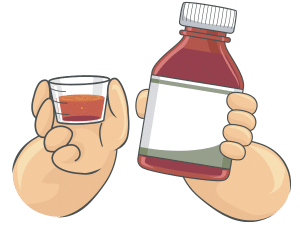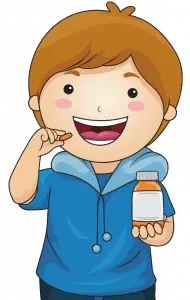My Autistic Child Won’t Take Medicine! What Should I Do?
Most kids run at the sign of medicine. Taking pills or drinking weird-tasting syrups is usually not something they enjoy.
As a result, getting your child to take medicine can be a challenge.
Things become even more challenging with trying to give medicine to our autistic children.
Autism Spectrum Disorder (ASD) is a type of developmental issue. It affects one’s ability to interact, relate, communicate, play and even learn.
According to the CDC, one in every 68 children is born with this Autism. And 58% of children with autism rely on some kind of medicine.
Many people may not like that statistic. But medicine often plays a significant role in dealing with certain symptoms that come with autism.
This includes anxiety, aggression, and hyperactivity.
It will be likely that as parents of autistic children, we will come across the problem of our kids refusing to take medicine.
In this article, I’ll give present answers to deal with this situation better.

If you have a child with autism, I recommend you look into the Autism Works program. It was designed to help you thrive as a parent and help your child live a life without limits.
Think best-selling author, motivational speaker, and entrepreneur, all while living with autism.
How To Get Your Child To Take Medicine:
I know how frustrating it can be when your child refuses to take medicine or spits it out. The more we try to push them to take the medicine, the more resistance they show.
If we keep pushing them, our child could develop a negative attitude towards medicine. So forcing our child to take medicine isn’t the way to go!
The most important thing is to remain calm and work through the problem.
Anxiety is not generally recognized as a main part of autism, but it is actually one of the most common symptoms.
Recent studies from the ADAA show that 40% of children with ASD suffer from some type of anxiety. The act of taking medicine can cause feelings of anxiety and make the experience worse.
Here are some of the tricks and tips you can use if your autistic child refuses to take medicine.
Note: Make sure to also read my recent article on My autistic Child Refuses To Sleep, and what to do about it.
How To Give Autistic Child Liquid Medicine

Most brands of children’s medicines will have a cherry/ strawberry or bubblegum flavor.
Mix the medicine with food/drink
This is the most common strategy to help your child take bad-tasting liquid medicine.
If this specific syrup does not come with added flavors, you can add flavor yourself.
This means, for instance, you can mix the drug with either ice cream or yogurt. The flavor profile of the medication and the food you are mixing it with, need to be a good fit.
By improving the taste of the medicine, you’ll give your concoction the best chance of success.
Make sure that your child takes the entire dose of the mixture if you want the medication to be effective. So make it yummy in some way! Have some fun and be creative!
If you have questions as far as what mixes well with each medicine, ask your local pharmacist.
Coat the tongue beforehand
Some people give their children a sweet drink after the child takes medicine. This can be a good strategy, but you may want to think more about the thickness of what you give your child.
Give your child some honey before administering medicine. This will leave a sweet taste and make it easy for your child to swallow and enjoy the medicine.
A soft drink will pass through the taste buds much faster. This could be good for washing medicine down, but not for taking away the bad flavor.
Numb the medicine with ice or by chilling it
Another trick to use with liquid medicine is to mix it with juice and freeze it. This does two things:
Your child feels like he is eating a popsicle and will be willing to try it. And if you get the flavor profile right, they might even enjoy it.
The second thing this does is that the ice from the popsicle will numb your child’s taste buds.
Another option is to give them ice before giving them the medicine. It’s almost like a natural flavor reducer.
How To Get An Autistic Child To Swallow A Pill Or Capsule

When giving children pills, there are generally two options: They swallow the pill or spit it all out.
Avoid forcing or pressurizing the child to take the pill, especially for children with autism. They might end up hating the pills.
This could be something that influences their view of medicine for the rest of their lives. Tread with caution!
Here are the best methods you can try to get your child to take pills and maybe even enjoy it.
The Gradual Shaping Technique
One of the main reasons children dislike taking medicine is because they are not used to the feeling of swallowing pills.
This can cause those feelings of anxiety and negative association we spoke about earlier. When we try to force a child to drink a pill, we reinforce a negative connection, and this usually makes things worse.
One way to get around this texture and taste rejection are to use the Gradual Shaping Technique.
This process is a behavior modification that teaches our kids to become familiarized and even enjoy the process of taking medicine.
It works by breaking down a task like taking medicine into small, easy, and enjoyable steps.
For example, when it comes to swallowing pills, we can start by giving our kids tiny candies. Small cake decorations work great as well.
5 steps to get your autistic child to take medicine:
Step 1: Start by showing them what to do before he tries it. Place candy on your and make it a fun, positive experience.
Step 2: When your child is relaxed and has seen you repeat this process, get them to take part by giving them a small candy to swallow.
Try using a variety of colors and flavors, so they do not get attached to a particular one.
Step 3: Try placing small candies on their tongues for them and have them swallow them. Then have him/her drink some water.
Step 4: Repeat this process several times until your child has mastered this process.
Step 5: Start introducing medicine and have them swallow it down with water. If they have difficulty doing this, return to the candy process and try again.
It might take you some time and a few tries to make this work, but it can be a permanent solution.
The Float Method
Children with autism can react negatively to taking pills. In fact, this is not exclusive to autistic children, a good percentage of all children will act like this.
The problem with taking a dry pill is that the mouth often runs out of saliva. Pills end up sticking on the tongue too much. Even as an adult, I have had this sensation.
This is not helpful when trying to encourage an autistic child to take a pill. This dryness can be tricky if the pill is only covered with a small layer of flavor.
To combat this, you can try making the pill float in the child’s mouth. First, give your child his or her favorite drink, then put the pill in his/her mouth.
This will help avoid it getting stuck and prevent the gagging and panic that may come with it.
Opening/Crushing Technique
Crush the pill or open the capsule and mix it with your child’s favorite drink. You can also mix it with your child’s favorite food.
Again, you have to be cautious about the types of drinks and food that you mix the medicine with. Make sure the two are a good flavor match.
I recommend you ask your pharmacist for some ideas as well as possible interactions. The problem with crushing pills into food or drinks is that your child has to finish the whole portion.
Leaving some might leave some medicine behind and he/she might not get the full dose. When following this method, use smaller amounts of food/drink.
Here are some additional tips to consider…
Praise your child
Make sure that after every time your child takes medicine without fuss, you praise them. Tell them how well they have done and how you are proud of how brave they were.
If your child sees you are sincere, this could have a great impact on them. It will encourage them to behave similarly the next time medicine comes up.
You could use a physical reward, but try not to make this anything too big. We want to avoid bribing our children to take medicine.
This is especially the case if your child has to take medicine regularly
Relate it to what your child likes
You can use your child’s interests to make the medicine-taking process more fun.
For example, you could buy a medicine box with your child’s favorite cartoon character on it (you could make it yourself if you are creative!).
You could buy a medicine-taking cup with the same character. Anything you use to take medicine could be turned into something that your child likes.
This might help by taking their attention away from the “yucky” medicine.
The Wrap-Up!
Thanks for reading my article on autistic children refusing to take medicine. It is a real pain point for many parents, and I hope I was able to help in some way!
Remember to stay calm, get to know your child, and try some of the tips I suggested.
Every child has their own unique traits and quirks, so we can’t guarantee instant success. With some perseverance with these methods, you can fix or improve the situation.
As before stated, be careful when you want to start mixing medicine with food or crushing pills.
Consult your doctor or pharmacist and explain your situation. They can guide you on how to do this and may be able to give you more tips as an added bonus.
Use the comment section to discuss and get advice from other like-minded parents.

PS. If you have a child with autism, I recommend you look into the Autism Works program.
It was designed to help you thrive as a parent and help your child live a life without limits.
Think best-selling author, motivational speaker, entrepreneur, all while living with autism.



